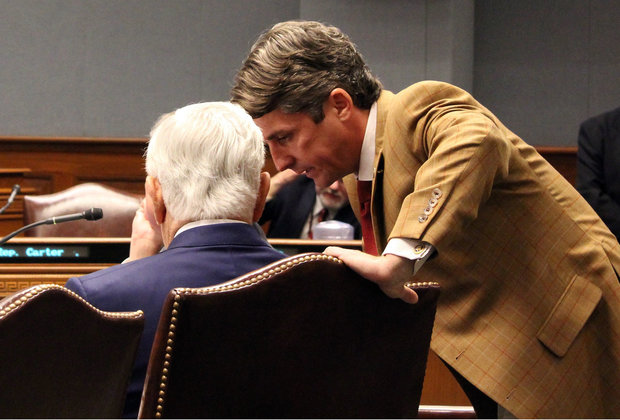BATON ROUGE — As House Republicans crafted their version of next year’s budget, they built the spending plan off a central premise: Louisiana’s income projections are always wrong, and for nearly a decade those missed forecasts have forced repeated cuts across government.
In the budget backed by the House on Thursday, GOP leaders anticipated the projections would be off again — and used 2.5 percent less than the full forecast of what Louisiana is expected to collect in general state tax dollars next year.
“From past experience, we know that collecting all of these dollars is highly unlikely,” said Appropriations Chairman Cameron Henry, a Republican who handles the budget in the House.
House Democrats and Democratic Gov. John Bel Edwards say leaving $235 million on the table could force damaging and unnecessary cuts across government for the financial year that begins July 1. They say health services for the poor would be harmed, prisons would be forced to release nonviolent inmates early and two veterans’ cemeteries would shutter.
“The House Republican leadership just rushed through a flawed budget that would send us tumbling backwards,” Edwards said in a statement that claimed the proposal would “endanger the health and welfare of the people of Louisiana.”
Republicans say the Edwards administration is using scare tactics.
At issue are projections developed by the Revenue Estimating Conference, the panel that sets Louisiana’s government income forecast each year.
The conference includes the governor’s commissioner of administration, the Senate president, the House speaker and an independent LSU economist. Votes to set the forecast must be unanimous. The conference chooses between projections devised by the Legislature’s chief economist and an economist who works for the administration.
The forecasts are never right down to the penny. They can’t be.
But the projections once were off in a way that created end-of-year surpluses. More recently, they’ve been overly optimistic amid national and state recessions, causing deficits when they are revised to reflect actual tax collections. Lawmakers also have made it more difficult to forecast, rewriting tax laws repeatedly since 2015 to try to fill budget gaps.
“Forecasting is a science in some fashion,” economist Manfred Dix, who works for the Edwards administration and also devised projections for former Gov. Bobby Jindal’s administration, told lawmakers. “But you also have an art portion, the human judgment.”
Henry said devising an on-spot forecast is “nearly impossible.” He cited 15 deficits over the last nine years and said the midyear cuts forced on agencies because of those gaps are destabilizing. He said giving agencies less money at the start of the budget year when they have time to plan, rather than cutting them with only a few months left, makes more sense.
“Spending 100 percent of a wrong number is not a good idea,” Henry said.
Democrats, including Edwards, said they support the concept of not spending every dime that is forecast — but only when they’ve stabilized Louisiana’s finances. Stripping dollars unnecessarily from agencies now, they say, compounds years of budget cuts.
“We’re going to continue to make these agencies crawl,” said Rep. Walt Leger, the highest-ranking Democrat in the House.
Rep. Sam Jones, a Franklin Democrat, said by removing dollars Edwards planned to spend in agencies like the health department, Louisiana also loses hundreds of millions in federal matching cash.
“How many people do you think will be denied services?” Jones asked Henry.
Nearly all Democrats opposed the budget proposal approved by the House. Negotiations now shift to the Senate on whether to back the House approach or make heavy revisions.





